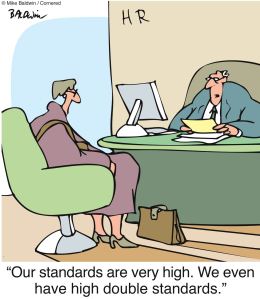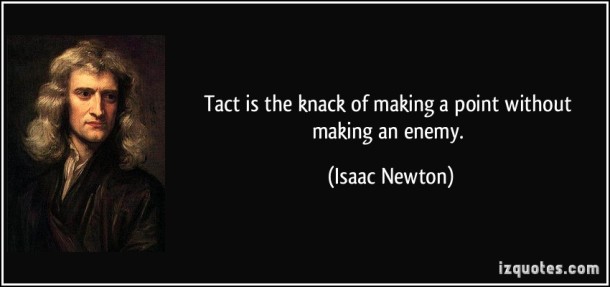An ongoing series of articles on some common and recurring weak arguments that Christians make against Mormonism.
by Fred W. Anson
“I find myself too often saying about a lot of Christians, ‘I agree with everything you say, but I disagree with the way you’re saying it. There’s a way of saying things that is redemptive and loving and there’s a way saying things that’s not redemptive and loving.’”
Dr. Richard Land
Public spokesperson for the Southern Baptist Convention in “Us and Them”
Introduction:
While we were preparing for this series we took careful note of the weak arguments, bad behavior, and counter productive debating tactics we saw some Christians using in their public engagement with Mormons. Those deserving of deep analysis became full articles, the rest went onto a special “grass catcher” list which I now present to you for your consideration:
How to Make Weak Arguments Against Mormonism:
- Be condescending and disrespectful. These people are obviously blind fools, make sure that they and the whole world knows it by talking down to and sneering at them. After all wasn’t the Apostle Peter just offering a suggestion rather than a mandate when he said: “But in your hearts revere Christ as Lord. Always be prepared to give an answer to everyone who asks you to give the reason for the hope that you have. But do this with gentleness and respect,” (1 Peter 3:15 NIV italics added)[1]
- Don’t back up your arguments with easily verifiable evidence. After all, everyone should just change their beliefs based on just some stranger’s claims and opinions alone, right? Wouldn’t you? Who needs supporting evidence?[2]
- “Link bomb” them. That is, copy and paste just the links to evidence rather than carefully selecting and citing the relevant content from those sources and then providing the link so it can be verified. In other words, make ’em work hard to disabuse themselves of their wrongheaded beliefs! After all, isn’t it their job to prove your point for you by digging, mining and sifting through the mountain of words that you’ve so generously brought to their attention? Let them find their own gold like you did – it’s in there somewhere, right? Besides, reading, listening, watching, transcribing, and citing is just such hard, time comsuming work – link bombing is so much easier! Doubt me? Boom! http://newyork.cbslocal.com/2013/08/01/survey-finds-internet-makes-people-rude-new-yorkers-agree/ You’re been link bombed! (That was easy)
- Speak in absolute and authoritative tones on subjects that you’re ignorant or uninformed on. Better yet do it on the Internet so that a worldwide audience can benefit from (or be entertained by) your “insight!” As the ancient proverb says so well, “Fools have no interest in understanding; they only want to air their own opinions.” (Proverbs 18:2 NLT)
- Tell Mormons to “look it up!” rather than serving them by providing the relevant information for your argument. Yes, that’s right, don’t provide a web link, a citation or any other verifiable evidence – why should you? They have eyes don’t they! They have brains don’t they? Of course, they’ll rush right out and do it – right? Isn’t that what you do when other people do this to you? Hey man, 99.9% of those surveyed do! It’s true! Look it up.[3]
- Just get right up on that Christian soapbox and set ’em straight! Preach Christian preach! After all, all you should need to do is speak the truth, right? So give to ’em with both barrels with all the best Christianese you know! Why do you need to learn anything about them or their heretical beliefs first? Just declaring God’s good truth should be enough shouldn’t it? In fact, wouldn’t taking an interest in and learning their heresies just validate them and keep them in error? Don’t lower yourself to the level of heretics and blind men – rather, preach Christian preach! Your fellow Christians will slap you on the back and praise you while all the befuddled Mormons are slowly walking away shaking their head wondering all that incomprehensible shouting was about. Mormons are just so blind and deceived aren’t they?[4]

- Only cite from Mormon Critics rather than Mormon friendly sources. After all, if it’s “Mormon Friendly” it must be enemy propaganda, right? All Mormons know how to do is lie and deceive anyhow, right?[5]
- Assume that the underlying meaning of the terms that you and Mormons use are the same. And whaddaya know! We use the same words, we must both be Born Again Christians! Who knew?[6]
- Give citations without providing the source so it can be verified for accuracy. Oh, and never make it easy by providing a web link to the source! Just throw it out – your word alone should be sufficient, right? By the way, did you know that the Eustace Scrubb character in C.S. Lewis’ “The Chronicles of Narnia” was Mormon? Yep, it’s true![7]
- Frame your arguments in outsider Christian language rather than insider Mormon language. So what if it’s like speaking in a foreign tongue to them? Hey, just yell that Christianese LOUDER, slower, and longer like a tourist on vacation in a foreign land. They’ll get it eventually! After all, they can always watch your hand signals right? Oh yeah, about that that hand signals thing when it comes to the internet . . . [8]
- Make sure that you never, ever enter a Mormon building like a Ward Building, Chapel, Stake Building, Temple tour, or Church Museum – you might get Mormon cooties or become demon possessed! After all, you can learn everything you need to know by talking to your Mormon neighbor over the backyard fence – they’re all experts on their faith and always represent their theology and practices as accurately as today’s Christians do theirs.[9]
- Never attend a Mormon Service or meeting (especially a Fast & Testimony meeting) lest you experience their culture first hand. Empathy is of the devil! Stay in dark ignorance regarding what really happens inside Mormon services so you can get it all wrong whenever you talk about those services. After all, you love it when Mormons make incorrect statements about what goes on in our services don’t you?[10]
- Treat antiquated Mormon sources as if they have as much weight and authority as modern official sources. Make sure you regularly quote from “The Journal of Discourses” and McConkie’s “Mormon Doctrine” as if they’re equivalent to today’s correlated manuals and literature. And if they object, they’re just uninformed about what their church really believes and teaches aren’t they?[11]
- Never concede well made arguments and credible evidence from Mormons. You must never, never, never yield an inch! After all this is war! Never give in and never surrender![12]
- Use derogatory, insulting terms like MORmON, Joseph’Smyth, Profit (instead of “Prophet”), TSCC (The So Called Church), Jo$eph $mith, Bring’em Young, Breed’em Young, Thoma$ Mon$oon, etc. Or go back in time and use the old 19th Anti-Mormon pejorative terms like “Joe Smith”, “Mormonites”, “Golden Bible”, etc. Conversely, you can merge current popular culture with Mormonism and invent new perjovatives like, “Morg” (Star Trek reference that blends “Mormon” with “Borg”), “Joseph Sith” (Star War reference that suggests that Joseph Smith was an evil Sith), “Darth Monson” (another Star Wars reference there), etc. The more condescending, offensive, and degrading the better – that way it’s clear whose side you’re really on, and of course, that true believing Mormons are stupid idiots who all deserve just what they’re going to get at the great judgment![13]
-
Create and use insulting Internet memes and graphics. Everyone loves getting insulted – be the Don Rickles of Mormon Studies, they’ll love you for it. After all, don’t you just love those angry atheist memes that insult and belittle Christians? They just make you want to run out and become an atheist in the worst way don’t they?
- Mock the LdS Temple Endowment ceremony. After all it’s sacred and stupid right? After all one can surely have meaningful conversation with someone’s back as they’re walking away, right? The fact that the endowment ceremony is an off-limits, “nuclear” subject in Mormon Culture is their problem not ours!
- Refer to Temple Garments as “Magic Mormon Underwear.” Let ’em them know how stupid and silly they really are! Better yet, wear them in public while donned in a gorilla’s mask, burn them, deface them, stomp and spit on them if you can.[14] After all, Christians never get upset when outsiders do that to clerical vestments, choir robes, or crosses do they?
- Show no empathy or understanding for the incredibly high price Mormons must pay for leaving the LdS Church. Hey man, it’s as easy as changing churches right? What’s the big deal? I mean Presbyterian to Baptist to Charismatic to Catholic to Lutheran and then back again – easy, peasy, there’s never much of a price to pay is there? Oh you lost your wife and family when you left the Mormon Church? And your job too? And you’re being shunned by your own family? Now that’s just downright weird isn’t it?[15]
- Use a lot of cliches, platitudes, and Christian folklore rather than anything of substance. In other words, use exactly the same kind of thought and emotional control tactics that Mormons use when engaging outsiders. It will really bless them, so they feel the anointing on you when you get out your “sword” and give them the word. Or, better yet, tell them about that angel encounter or Near Death Experience (NDE) that you heard about on Christian TV last week. Get right or be left man, because inch by inch life is a cinch, yard by yard life is hard – it’s in the Book!
- Appeal to feelings rather than intellect – after all, it worked so well in getting and keeping them in Mormonism? Maybe lightning will strike twice, so have them read the Bible and pray about if it’s true or not . . .[16]
- Hyper-spiritualize everything. For example, rather than using even toned language and verifiable evidence against Mormonism make statements like: “Mormonism is a demonic religious system which has led millions to hell”, or “Mormons are all demon possessed, under the influence of deceiving spirits”, or “The Lord showed me that Mormons will be key leaders in the Antichrist’s one world government – Mitt Romney is just the beginning”, etc. Of course since none of this can be objectively proved or verified it really just pits two competing belief systems, religious cultures, and value systems each other. To transitioning Mormons this just demonstrates (beyond a shadow of a doubt they very often think) that mainstream Christianity is just as fanatical and subjective as Mormonism. Yes, they’ll thank you as they just pass right on by on their way to atheism muttering a dismissive, “There’s no difference between the two, they’re both the same!”[17]
 Use double standards. For example, make a big deal over the fact that God the Father isn’t explicitly identified as the personage who says, “This is My Beloved Son. Hear Him!” (Joseph Smith History 1:17) in Joseph Smith’s First Vision but ignore the fact that neither is He explicitly identified in Matthew 3:17 as the voice from heaven that says, “This is my beloved Son, in whom I am well pleased.” Why be fair? The ends justify the means, right?
Use double standards. For example, make a big deal over the fact that God the Father isn’t explicitly identified as the personage who says, “This is My Beloved Son. Hear Him!” (Joseph Smith History 1:17) in Joseph Smith’s First Vision but ignore the fact that neither is He explicitly identified in Matthew 3:17 as the voice from heaven that says, “This is my beloved Son, in whom I am well pleased.” Why be fair? The ends justify the means, right?- Argue that just one of Joseph Smith’s failed predictions of the future qualify him as a False Prophet per Deuteronomy 18:20-22, but ignore the fact that applying the same criteria in the same way that’s applied to Smith also makes Hal Lindsey, Chuck Smith, Harold Camping and other respected Christian leaders with failed predictions of the future False Prophets too. Again, why be objective and fair?[18]
- Engage in what Christian Apologists call a “Scorched Earth Tactics“. That is, win at all costs rather than adhering to the golden rule of Christian apologetics, which is, “Always treat your debating opponent’s evidence and arguments the way that you would want to have your evidence and arguments treated” Nothing drives ’em away or drives them into atheism like going “Scorched Earth” on ’em does – go for it! Win at all costs Christian, win!
- Criticize, condemn, or praise authors, books, and articles that you haven’t read. And do the same for films, videos, and audio (like podcasts, lectures, and sermons) that you haven’t experienced first hand. Everyone knows that hearsay and innuendo is just as good as direct experience. Better yet, throw in some unfounded bigotry and prejudice! You know say things like, “D. Michael Quinn‘s popularity just baffles me. Not only is he a believing excommunicated Mormon but he’s gay to boot! With that combination you really can’t expect too much can you?”; or, “What’s up with Richard Bushman? ‘Rough Stone Rolling’ should have been published by FAIRMormon it’s so filled with apologetics instead of real honest to goodness history!”; or how about, “Alex Beam‘s ‘American Crucifixion’ disrespects crucifixion in it’s title! Doesn’t he know that Joseph Smith had a gun at Carthage Jail? Who carries a gun to a crucifixion?”; and last but not least, “I’ve heard that that ‘September Dawn’ is the closest thing to an accurate documentary on the Mountain Meadows massacre that we’ll ever get.” You get the idea.[19]
- Be just as fanatically Christian as they are fanatically Mormon. Since religious fanaticism is the fuel driving the Mormon belief system your behavior will be like filling up their tank without them even needing to get out of the driver’s seat! Oh, and this has the added “benefit” of driving them right into atheism should they leave since it makes it look like Christianity is just the opposite side of the same fanatical religious coin that Mormonism is on.
- In mixed company act like there are no Mormons present. Say things like, “Can you believe how pompous, self-righteous and arrogant Mormons are?”, “Mormons are like lemmings – if the Prophet told them to jump off a bridge they would do it!”, “Those ignorant Mormons, I know more about their religion that they do!” And of course, when the Mormons say, “Uh, I’m right here, I can hear everything you’re saying” and object to such crass prejudice and bigotry don’t apologize and don’t back down – in fact, up the ante, say even more outlandish things about those stupid Mormons right to their face!
- Paint with the broadest brush possible. Use wild, spectacular, over-generalizations delivered using the most absolute tone and words possible. You know, things like: “All Mormons lie in their Temple Recommend Interview”, “You’ve gotta know that every Mormon man is secretly addicted to pornography – Utah’s porn statistics are off the chart!”, “All dating BYU couples do the ‘Provo push!'”, “All Mormon women are treated like chattel by their priesthood holding husbands – it’s a holdover of 19th Century polygamy!” etc., etc., etc. The broader the better and the more spectacular is it the more people will be inclined to believe you – so go big, don’t hold back.
- Exaggerate and twist. Take something with a modicum of truth in it and expand, embellish, and massage it to the point where even the modicum disappears under an avalanche of hyperbole. For example, say something like “Mormonism replaces the cross with the pentagram!”[20] Or say, “Mormons shun the blood of Christ by using water in their communion service!”[21] Vetting, verifying, and refining your assertions so that they’re accurate and true is just so much work! Plus balance and precision doesn’t pack the same emotional punch as exaggerated hype – so why bother?
- Insist that Latter-day Saints should leave Mormonism over a single problem. For example, over the fact that the Book of Mormon anachronistically has the French word “adieu” in it (see Jacob 7:27) or that it incorrectly states that Christ was born in Jerusalem (see Alma 7:10).[22]
- Make sure that you use a lot of snark and sarcasm! Everyone loves being condescended to by obnoxious smart alecks with bad attitudes. By the way, I hope you’re loving reading this article as much as I am writing it. If not, you’re a just loser who just doesn’t “get it!”[23]
- Say things like, “The ends justify the means” to rationalize your bad arguments and behavior. Sure, it’s not biblical, but why be picky when souls are at stake here?
- Use the bad arguments and behavior of Mormons to justify any or all of the above.
- Assume that any constructive criticism from fellow Christians on how to better engage Mormons is meant for everyone else but you.
Summary and Conclusion:
Now I confess that in my early days in Mormon Studies I engaged some of these weak arguments – and on my bad days, sometimes I still do. But the fact remains that as Christians we have a higher calling. I would ask the reader to consider the following, knowing full well that while I may be preaching to others I am preaching to myself first and foremost.
First, this form of engagement is unbiblical. Here’s how the Bible instructs us to behave toward those who disagree with us:
Opponents must be gently instructed, in the hope that God will grant them repentance leading them to a knowledge of the truth,
(2 Timothy 2:25 NIV)Let your conversation be always full of grace, seasoned with salt, so that you may know how to answer everyone.
(Colossians 4:6 NIV)But in your hearts revere Christ as Lord. Always be prepared to give an answer to everyone who asks you to give the reason for the hope that you have. But do this with gentleness and respect,
(1 Peter 3:15 NIV)
Second, it’s just common sense that these tactics are more inclined to drive people away from Christ than draw them near. If and when the roles are reversed I’ve noticed that Christians react the same way that Mormons do: They walk away wanting to have nothing to do with the person, their stance, or their beliefs.

Jackson Pollock “Lucifer” (1947). What Christian-Mormon dialog looks like when the above tactics are used by either side.
Third, it violates both the Golden Rule which says…
Therefore, whatever you want men to do to you, do also to them, for this is the Law and the Prophets.
(Matthew 7:12 NKJV)
… and the Golden Rule of Apologetics which says:
“Always treat your debating opponent’s evidence and arguments the way that you would want to have your evidence and arguments treated“
Simply put, there’s just no excuse for Christians to be chronically using the type of tactics and arguments that I’ve listed in this article. And I say this knowing full well that Jesus, the Old Testament prophets, and the Apostles used sarcasm – and even some very harsh and pointed words – in their arguments. After all, I’ve followed their lead by using such tactics in this article haven’t I? However, I would suggest to the reader that these tactics were reserved for hard cases and as a kind of last resort, in no case did Christ or any of the other Biblical figures lead with these tactics or use them in every encounter. So if you find yourself doing so I would ask you to stop, consider the mind of Christ, and change direction. As Paul said so well:
Let nothing be done through selfish ambition or conceit, but in lowliness of mind let each esteem others better than himself. Let each of you look out not only for his own interests, but also for the interests of others.
Let this mind be in you which was also in Christ Jesus, who, being in the form of God, did not consider it robbery to be equal with God, but made Himself of no reputation, taking the form of a bondservant, and coming in the likeness of men. And being found in appearance as a man, He humbled Himself and became obedient to the point of death, even the death of the cross. Therefore God also has highly exalted Him and given Him the name which is above every name, that at the name of Jesus every knee should bow, of those in heaven, and of those on earth, and of those under the earth, and that every tongue should confess that Jesus Christ is Lord, to the glory of God the Father.
(Phillipians 2:3-11 NKJV)
So I pray that that mind will be in us as engage with our Mormon friends and family members as we navigate through the dangerous land of Mormon Studies – a land where animosity and acrimony rule the day every day. I pray that we would be a healing balm and a exit route to truth rather than fuel on the fire and scorched earth. Maybe we would all do well to remember the ancient prayer that says:[24]
Lord, make me an instrument of Your peace;
Where there is hatred, let me sow love;
Where there is injury, pardon;
Where there is discord, harmony;
Where there is error, truth;
Where there is doubt, faith;
Where there is despair, hope;
Where there is darkness, light;
And where there is sadness, joy.O Divine Master, Grant that I may not so much seek
To be consoled as to console;
To be understood as to understand;
To be loved as to love.
For it is in giving that we receive;
It is in pardoning that we are pardoned;
And it is in dying that we are born to eternal life.
(St. Francis of Assisi)
NOTES
[1] And before the “You’re a hypocrite – just look at the tone and content of your article!” phone calls, and letters start pouring in, the first part of this article was written in a tongue in cheek style that’s intended to mirror the same condescension, disrespect, snark, and sarcasm that are so prevalent in the weak arguments and tactics that are being addressed. If you’re offended by it then please consider how such behavior feels to our Mormon friends and family members when it’s directed at them.
[2] “What can be asserted without evidence can be dismissed without evidence.” (Hitchen’s Razor)
[3] NOT! Nobody does this. It’s the responsibly of the person making an assertion to prove it. It’s not their debating opponent’s role or responsibility. This is just common sense folks! This is the laziest form of scholarship imaginable – if you can even call it “scholarship.”
[4] This was covered by implication in “Weak Arguments #9: “I don’t need to understand Mormon culture or learn how to speak like a Mormon…” However, since Christian soap boxing is so prevalent, it bears repeating. And Utah Presbyterian Pastor Jason Wallace does a superb job of addressing this and other issues as they relate to street preaching in this episode of “The Ancient Paths”:
Also, as a point of clarification, please understand that public soapboxing does have a place and can be effective if it’s done biblically and appropriately. After all Christ did a lot of soapboxing – but it was always tailored and targeted for the audience that He was addressing. I would encourage you to consider how His tone, methods, and demeanor changed when His audience was the Jewish downtrodden (Matthew 11:25-30), versus the hard hearted (Matthew 11:20-24), versus the Jewish privileged (Luke 11:45-54). Then consider how it changed again when His audience wasn’t Jewish (John 4; Matthew 8:5-13; Matthew 15:21-28). Then when we look at the Apostles Paul’s writings and message are very different than, say, the public soapboxing we see in his Mars Hill address in Acts 17.
The basic problem here is a lack of social and cultural sensitivity, discernment and respect. If you truly love someone you will speak to them in a way that they understand and can receive your message. Christians who are “one trick ponies” on soapboxes – that is, that only have one approach and one message regardless of the audience – aren’t doing anyone any favors.
[5] This is covered to some degree in “Weak Arguments #11: “I will never, ever use official Mormon Church sources…” However, even unofficial Mormon friendly sources can be rich in content and potent in argument. I particularly recommend the works of D. Michael Quinn, Todd Compton, Richard Bushman, Charles Harrell, Rock Waterman, Denver Snuffer, and many other faithful, but intellectually honest Mormons. Let me put to you this way: Who do you think a Mormon is more likely to listen to: you, a critic, or a fellow believing Latter-day Saint?
[6] Suffice to say, Mormonism takes Christian words and forms and changes their underlying meaning. For a good primer of the terminology differences see “Terminology Differences” by Sandra Tanner. For a more in depth study and analysis of the subject see “Words We Share” by Sharon Taylor and Gerald Van Iwaarden.
[7] Of course, I’m demonstrating how Christians do this in a very tongue in cheek fashion here. And by the way, the speculation about Eustace Scrubb being Mormon is probably wrong. See Michael De Groote, “What C.S. Lewis thought about Mormons” Deseret New/Mormon Times, June 5, 2009. And since it annoyed me to not to be able to include the reference links for Eustace Scrubb and “The Chronicles of Narnia” in the main article (to do so wouldn’t have accurately reflected the behavior I was illustrating) I’ll do so here instead. Whew, I feel better now! Thanks!
[8] Just like no one can hear you scream in space, no one can see your hands in cyberspace – I just thought that you’d like to know.
[9] The unbiblical folly of this thinking was directly addressed in “Weak Arguments #9: “I don’t need to understand Mormon culture or learn how to speak like a Mormon…” As I said there, “if Christ could sit on the edge of a well and talk to Samaritan woman I think that we can somehow manage to stand by the water fountain in a Mormon Ward building and chat with Mormons can’t we?”
[10] Ibid.
[11] This was addressed by Bobby Gilpin in “Weak Arguments #3: “I know what you believe, because Brigham Young, Bruce R. McConkie or some other general authority said…..”
[12] This is addressed in “Weak Arguments #14: “There’s NOTHING in Mormonism that’s true – it’s all wrong and nothing but a pack of lies!”
[13] Each and every one of the derogatories used here were copied and pasted from actual Christian posts on Facebook and YouTube.
[14] Again this is not made up. From Wikipedia:
Some church opponents have used public occasions, like the biannual church conferences, to publicly mock and parody the wearing of temple garments. During the October 2003 LDS Church General Conference, some anti-Mormon demonstrators outside the LDS Conference Center reportedly spat and stomped on garments in view of those attending the conference. One protestor blew his nose into a garment he wore around his neck. A scuffle broke out between a protester and two members of the church who attempted to take the garments from him. To avoid a repeat of the conflict, the municipality of Salt Lake City planned stronger enforcement of fighting words and hate speech laws for the April 2004 conference in Salt Lake City with new protest buffer zones.
(Wikipedia, “Temple Garment Use in Protests”)
[15] Please read, “The Death of Reason and Freedom” by Enigma. I believe that it will help even the most hard hearted Christian understand the dilemma that unbelieving “Shadow Mormons” too often fall into. The highest recommended is also given to Azra Evans’ classic essay, “Families Held Hostage”.
[16] Clinton Wilcox discussed why this is not only a bad argument but unbiblical to boot in, “Weak Arguments #8: ‘I testify that Mormonism is false and Joseph Smith was a false prophet.’”
[17] Again, none of these are made up. They’re all comments that the author has seen posted on the internet by welling meaning but misguided Christians.
[18] And, yes, Mormons use exactly the same apologetic rationalization for Joseph Smith that Christians often use for the Christians named here. Please consider the FAIRMormon portal page, “Joseph Smith/Alleged false prophecies” The arguments that FAIRMormon uses for Smith are similar, and in many cases identical, to the arguments use for those on our side of the divide who have failed predictions of the future. My point here is simple: We can’t apply one standard to those in our group and another to those outside of our group. We must be consistent and be consistent or we’re not credible and lack integrity.
For those looking for a good example of how this weak argument is used by Evangelicals will find one here: The Prophecies of Joseph Smith, by James K. Walker.
For those unfamiliar with the failed prophetic predictions of Evangelical Christian preachers Hal Lindsey, Chuck Smith, and Harold Camping need only click on their names. Gary DeMar has also written a good summary article on their failed predictions. Click here to read this article.
[19] Things to consider in response to these examples:
- D. Michael Quinn, is widely regarded as the one of the top Mormon Historians of his day by both Mormons and non-Mormons alike. The consensus is that his work largely reflects a lack of bias despite his belief in and testimony of Joseph Smith and the Mormon Church. The exception to this consensus position typically comes from Mormon Apologetic groups. And I have never understood why some people think that Quinn’s homosexuality would impact his intellectual integrity or professional objectivity but it seems to get flung out a lot by Mormons and Christians alike. I would ask the reader to just read some Quinn and see if they can see overt bias in it. I don’t. For example, here’s a transcript of the infamous “Plural Marriages After the 1890 Manifesto” paper (aka “The Buffdale Speech”) that many people think was a key factor in him getting excommunicated in 1993.
- Richard Bushman has admitted repeatedly in interviews that while he makes every effort to be objective he may tend to give Joseph Smith the benefit of the doubt in his work due to his faith (click here for one such example). And candidly, his bias does occasionally leak through in his work – Peter Mary does a superb job of demonstrating this in his review of the book (click here). Never-the-less his work is remarkable for it’s level of candor and true Mormon history given his status as a faithful Mormon in good standing with the LdS Church. “Rough Stone Rolling” is always the first book that I recommend to Mormons who express a desire to know the truth from a faithful source and I don’t see that changing anytime soon.
- Alex Beam is a faithful and practicing Episcopalian and his book “American Crucifixion” has garnered praise for the depth of detail it goes into regarding the circumstances and events surrounding the death of Joseph Smith – including the smuggled guns that Smith and his associates carried and shot at Carthage Jail which wounded several of their attackers. The last thing that Alex Beam intended was to disrespect or degrade anyone or anything, least of all Christ’s crucifixion, with the title. He has explained that the title was intended to be provocative and reflective of the strong feelings and historical impact that Smith’s death generated (click here and then fast forward to 34:10 to hear Mr. Beam’s explanation for yourself). He was also drawing attention to the parallels with Christ’s passion that Smith articulated himself regarding his circumstances during the last days of his life. Joseph Smith was notorious for such over the top hyperbole – much to the delight of his faithful and the scorn of his critics.
- “September Dawn” is a Hollywood film that was intended more to entertain than educate. The film contains some historical errors (click here to read Bill McKeever’s excellent analysis and review of the film) and even more unsupportable, speculative embellishment. It’s not a bad film but it’s certainly not a good documentary. In this author’s opinion, the best Mountain Meadows massacre documentary to date is Brian Patrick‘s award winning “Burying the Past”. It isn’t as entertaining as September Dawn but it’s certainly more enlightening – and it’s historically accurate.
[20] Regarding the use of the Pentagram in Mormon architecture: a) The meaning of the inverted 5-pointed star changed in the late 19th Century; b) Other Mormon denominations (like the RLDS/Community of Christ) use the cross in their architecture; c) Pentagrams aren’t used in modern LdS Church architecture. The exception being when a modern structure is being built that’s based on a historic design. For example, the 2002 Nauvoo Temple still retained the pentagrams from the original design but also used upright 5-pointed stars for the new, modern design elements.
For example, notice that the stars in the exterior fence in the following photo – which is a new, modern element – are upright but the stars in the upper windows which were in the original 1836 design are inverted.
For a full discussion of the history of the cross in Mormon architecture and culture see Michael G. Reed, “Banishing the Cross: The Emergence of a Mormon Taboo”. His Sunstone presentation on the book can be found here.
Mr. Reed’s explanation of the use of pentagrams in Mormon architecture can be found here. If the reader prefers a Christian analysis of the subject, Bill McKeever’s article on the subject can be found here.
[21] Regarding the use of water instead of wine or grape juice in the Mormon sacrament: a) Wine was originally used in Latter Day Saint communion services; b) Due to an unfounded rumor that Anti-Mormons were trying to poison the sacramental wine in 1830 and then due to the Word of Wisdom they switched to water; c) The use of water a hold over from the 19th Century temperance movement that got institutionalized and concretized by the Salt Lake City Brighamite Mormon denomination; d) Other Mormon denominations use grape juice rather than water in their services; e) Prior to Dr. Welch (a temperate Methodist) discovering a way to stop the fermentation in grape juice many temperate churches used water instead of grape juice in their services – were they “shunning the blood of Christ” by doing so? Glass house meet rock.
To gain a good overview of the subject from a Protestant perspective see Terry Hull, “How Grape Juice was ‘Invented’ to Make the Lord’s Meal Holier”. A good overview Mormon History in this area can be found here.
[22] Bill McKeever and Eric Johnson explain why the “adieu” anachronism alone isn’t sufficient grounds for a Mormon to leave the LdS Church in their January 23rd, 2015 Viewpoint on Mormonism podcast. And I explained why the “Jerusalem” slip of the pen on it’s own isn’t either in “Weak Arguments #10: “The entire Book of Mormon was discredited just as soon as it said that Christ was born in Jerusalem.” As I stated in my article:
“Should Christians declare the entire Bible discredited because of it [a single biblical contradiction]? Even Atheist critics and Muslims don’t suggest such a response because it’s so ‘over the top’. Yet, many Christians would demand exactly that of Mormons over Alma 7:10. To me, such a demand on Mormons reveals an extreme bias on the part of some Christians and the type of unjust, uncharitable treatment that can drive Mormons deeper into the LdS Church if they stay, or right past Christianity and straight into atheism if they leave…
Most ExMormons tell us that there wasn’t just one thing that convinced them that the truth claims of the LdS Church don’t add up, it was a culmination of a lot of little things. They say it’s like a bunch of pebbles being tucked away on a shelf in a deep, dark corner – that is until the shelf finally collapses under the weight of them all.”
Simply put, expecting anyone to leave their faith over a single problem or argument is pretty silly and naive. Politely and respectfully building a case takes longer and requires more effort but it’s ultimately how and why most people are disabused of closely held and comforting error and self-deception.
[23] Please see footnote #1.
[24] And if the Prayer of Saint Francis doesn’t suit you, perhaps 20th Century Theologian Reinhold Niebuhr’s “Serenity Prayer” will:















Wow…very well done. Seems like brother Bobby and I are on the same page when it comes to appropriate styles for defending the gospel of Jesus Christ. I really like #32. You mean you can’t beat someone over the head with the REAL Jesus by running down the cheap, fake, cardboard imitation Jesus that the Mormon’s have?
Tact is the knack of making a point without making an enemy. (Isaac Newton)
I personally think this is one of the best articles you have produced. Again, very well done.
-Ned
Hey there Ned thanks a lot for that.
I did not actually write this, my good friend Fred W Anson did, however I am totally in agreement with what he says here and I hope this will help to encourage some positive dialogue.
Fred, I think you’ve pointed out some very important things that non LDS need to remember when ministering to the Mormon people . Thanks .
Thank you Mike.
And I hope that everyone caught from the introduction that there isn’t a single item on this list that I had to contrive or imagine – these were all, without exception, taken from observed behavior and actual incidents while the “Weak Arguments” series was being researched and compiled.
All I did was take notes.
Brilliant as always! Thanks for this series. Hope sometime you can come to Cumorah and help out CRC! We don’t have access to as many Mormons as we used to, but we can still talk to people. Last night was – well, er – the last night. The LDS is always playing a chess game with us, and they had some good moves this year. But we played back and did well.
This is good, but don’t forget to refer to LDS scholarship as pseudo scholars. It helps the CPART and maxwell institute folks as well as BYU Jerusalem take you seriously.